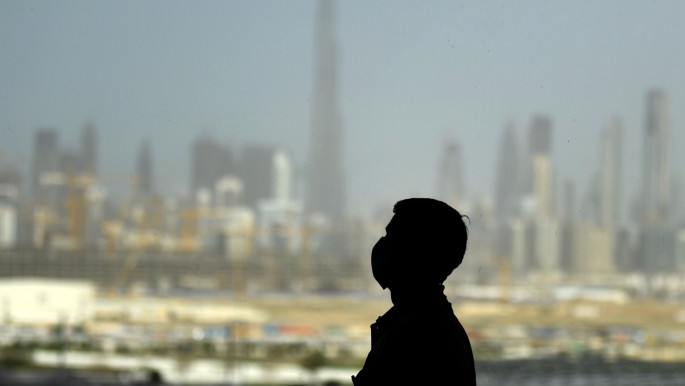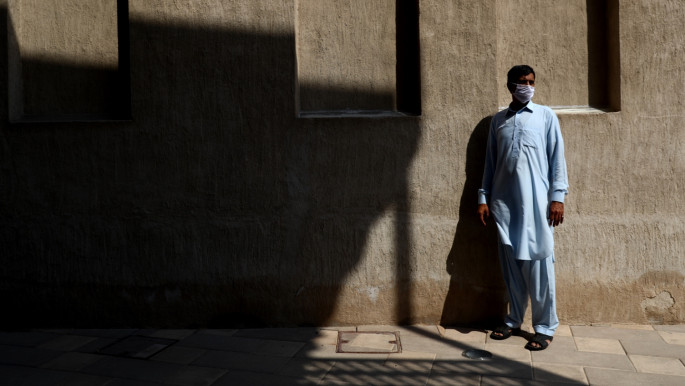Dubai's economy faces fight for survival in post-pandemic future
Like many countries, the loss of demand for crude oil and subsequent shock to oil prices, along with global lockdowns, will impact the UAE in both its oil and non-oil economy, despite its strong financial reserves and small population. It may face even greater losses compared to the 2007-08 crisis.
"Economic indicators suggest that the collapse in the second quarter of 2020 is much deeper and more severe than the collapse of the financial crisis of 2008," Fatima Saeed al Shamsi, Deputy Executive Director for Administrative Affairs at Sorbonne University Abu Dhabi, told The New Arab.
"While these are expected to recover faster than the financial crisis, economists expect the negative impact to continue significantly for more than two years to come and its effects will be worse than the collapse that occurred after the financial crisis."
The UAE imposed lockdown measures from mid-March to contain the virus. Meanwhile as tourism dried up, its beaches and hotels in Dubai laid empty, as did eminent structures like the Burj Khalifa, Dubai Mall, the Palm Jumeirah, and Mall of the Emirates.
 |
Renowned for its abundant wealth, the UAE and particularly its second richest Emirate Dubai face considerable economic setbacks from the coronavirus |  |
"Sectors that are likely to be most affected by the pandemic account for over half of the UAE's total GDP (and just under half of the non-oil GDP) and an even greater share of Dubai's GDP," said a report prepared by Moody's, one of the 'big three' credit rating agencies of the world.
Harsh Impacts on Dubai
Dubai moved to reopen its economy in late May, granting permission for retail, gyms, movie theatres, and other non-essential businesses to resume activities. Yet it still faces upcoming challenges. The Dubai Chamber of Commerce and Industry (DCCI) indicated that 70 percent of companies operating in Dubai anticipate going bust and suspending their activities within the next six months.
"The multidimensional effects of the pandemic have led to severe trade disruptions and losses, affecting job generating sectors and businesses. In addition, global containment measures have resulted in a significant decline in external demand," said Dr. Al Shamsi.
 |
|
| Read more: Gulf migrant workers count the cost of coronavirus |
"The global slowdown has affected global supply chains, as well as on the employment-rich retail and manufacturing sectors and small and medium-sized enterprises in the country. At the same time, restrictive containment measures taken by the UAE government and fear of society's resuming contagion have weakened consumer demand, particularly in the tourism, hospitality and retail sectors," she added.
Dubai's economy was already lagging last year, with property prices down 25 percent since 2014, posing problems for the country's real estate. Growth in gross domestic product decelerated to 1.9 percent in 2018, while growing by 2 percent in 2019 - a sluggish rate compared to earlier in the decade.
"The diversified aspects of the UAE economy, mostly in Dubai, are extremely sensitive to the Covid-19 pandemic and oil demand destruction," Dr. Karen Young, resident scholar at the American Enterprise Institute, told The New Arab. "The economy will face a sharp slowdown, demographics will shift in the labour market, companies will close and there will be a period of recalibration."
 |
Sectors that are likely to be most affected by the pandemic account for over half of the UAE's total GDP and an even greater share of Dubai's |  |
It meanwhile pinned hopes on the Dubai Expo 2020 world fair, due to be held in October and previously expected to attract around 11 million worldwide visitors. Having been cancelled, Dubai received permission to postpone it to 2021, which would boost Dubai's recovery.
Impact on livelihoods
Such losses could still deliver harsh consequences for the country's residents. A survey in April showed that 64 percent of UAE residents are concerned about potential job losses and pay cuts. Several Emirati residents, particularly those working in finance and the public sector, tell The New Arab that they have experienced salary cuts since the lockdown.
"The government's capacity to employ citizens in the public sector is expected to diminish, and as the private sector hesitates further as a result of the pandemic, unemployment may rise and the standard of living of citizens may decline as some government services may be reduced," said Dr. Al Shamsi.
Many of the UAE's migrant workers, who constitute around 80 percent of the country's population, have already been left redundant, particularly those from poorer countries working in affected industries like tourism and hospitality. Some foreign workers report being trapped and in debt, without the promise of expatriation.
 |
|
| Read more: Gulf recession reverberates across Asia as remittances from migrant workers plummet |
Meanwhile the Dubai-based airline Emirates said on 31 May it expects to cut some of its 60,000 staff, though exact numbers were not announced at the time. It also expects to take up to four years to resume flying its entire operations.
Another Abu Dhabi bailout?
The comparatively richer Emirati capital Abu Dhabi is tipped to rescue Dubai, as it did after the 2007-08 financial crisis. In 2009, Abu Dhabi gave Dubai a combined sum of $20 billion, a lifeline for the troubled Emirate, which also sent Dubai's shares soaring. Much of this support went into the state-owned investment company Dubai World, alongside Abu Dhabi gaining stakes in other key areas.
The bailout saw the name change of Burj Khalifa from Burj Dubai, after its inauguration in 2010. Yet in the tower, one could still purchase souvenirs such as key rings labelled Burj Dubai, indicating resentment towards the change.
Yet along with the bailout granting Abu Dhabi greater cultural influence, this sped up the centralisation of power within the UAE towards the capital. Dubai also became more financially dependent on Abu Dhabi; last year, Dubai still had to seek an extension to its bailout loan from Abu Dhabi.
 |
The comparatively richer Emirati capital Abu Dhabi is tipped to rescue Dubai, as it did after the 2007-08 financial crisis |  |
Now Abu Dhabi is reportedly in talks with Dubai to link up assets in the two's economies. Abu Dhabi's state fund Mubalada is tipped to play a key role. Facing fewer economic consequences, Abu Dhabi has the financial capabilities to bail out its little brother.
A source told Reuters that said any support from Abu Dhabi agreed now would be "orchestrated through mergers of assets where Abu Dhabi and Dubai compete directly or where they have joint ownerships".
"The most likely deal to happen in the near term is a merger of the local stock markets," the source said, adding that bank mergers were also possible.
With a lack of confirmation from either Emirate, details of a potential bailout are currently unclear.
"It will likely be in combination with Emirate-level efforts to support government-related entities. There could be consolidation in some sectors, particularly in financial centres and key businesses like airlines," said Dr. Young.
The aviation sector is tipped as a likely merger, as Dubai's Emirates airlines was previously speculated to integrate with Abu Dhabi-based airline Etihad Airways even before the coronavirus crisis.
Abu Dhabi previously competed with Dubai culturally, for instance having developed its own tourism industry, including theme parks such as Ferrari World and Warner Bros. World, along with the Louvre Museum. This crisis may trigger further cultural shifts within the UAE in favour of its capital.
Jonathan Fenton-Harvey is a freelance journalist.
Follow him on Twitter: @jfentonharvey

![Palestinians mourned the victims of an Israeli strike on Deir al-Balah [Getty]](/sites/default/files/styles/image_684x385/public/2024-11/GettyImages-2182362043.jpg?h=199d8c1f&itok=xSHZFbmc)


![The law could be enforced against teachers without prior notice [Getty]](/sites/default/files/styles/image_684x385/public/2178740715.jpeg?h=a5f2f23a&itok=hnqrCS4x)
 Follow the Middle East's top stories in English at The New Arab on Google News
Follow the Middle East's top stories in English at The New Arab on Google News


